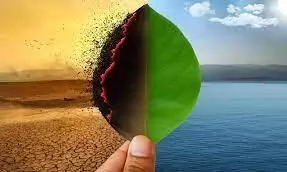
WMO report highlights India's wetter, warmer decade due to climate change
text_fieldsA recent report released by the World Meteorological Organisation (WMO) during the UN climate conference has underscored the decade from 2011 to 2020 as being significantly wetter and warmer for India, attributing this shift to the exacerbation of climate change.
Termed the warmest decade on record, the report, titled The Decadal State of the Climate 2011-2020, emphasised the alarming acceleration of climate change during this period.
This decade's climatic data, complementing the WMO's annual State of the Global Climate reports, revealed a surge in the rate of climate change, signifying an intensification of global warming.
Amid this revelation, the provisional annual report for 2023, unveiled at COP28 last week, forecasted 2023 as potentially the warmest year recorded to date.
Describing the period as a "wet decade," the WMO highlighted heightened precipitation over northwest India, Pakistan, China, and the southern coast of the Arabian Peninsula. Additionally, it noted an alarming increase in extreme warm days, nearly doubling the average of the preceding decades, particularly in southeast Asia, Europe, southern Africa, Mexico, and parts of eastern Australia.
Conversely, the report indicated a decline in extreme cold days and nights, marking a 40% decrease compared to the average between 1961 and 1990, attributed to escalating global temperatures.
The document underscored specific climatic events in India, such as the catastrophic flooding and landslides in Uttarakhand in June 2013, claiming the lives of over 5,800 individuals. It further highlighted Kerala's devastating floods in 2018, followed by two of India's wettest monsoon seasons in 2019 and 2020, resulting in widespread flooding and over 2,000 flood-related deaths across India and neighbouring regions.
Droughts during this period significantly impacted socioeconomic factors, leading to severe food and water insecurity across 11 of India's 28 states. The situation exacerbated existing inequalities in water access, compelling 82% of households in affected regions to rely on India's Public Distribution System for staple food grains.
The report also addressed the global implications of climate change, spotlighting the accelerated thinning of glaciers worldwide, posing threats to water supplies for millions. It highlighted a substantial increase in ice loss from Antarctica and the resultant rise in sea levels, posing imminent risks to low-lying coastal regions and states.
WMO Secretary-General Petteri Taalas stressed the continuous escalation of global temperatures and accelerating ocean warming, emphasising the direct correlation between greenhouse gas emissions and the alarming trends witnessed.
Weather and climate-related events were flagged as major contributors to global disasters, significantly impacting efforts to tackle hunger, food insecurity, and malnutrition. The report advocated for a significant increase in climate finance to meet the goals aimed at mitigating climate change.























